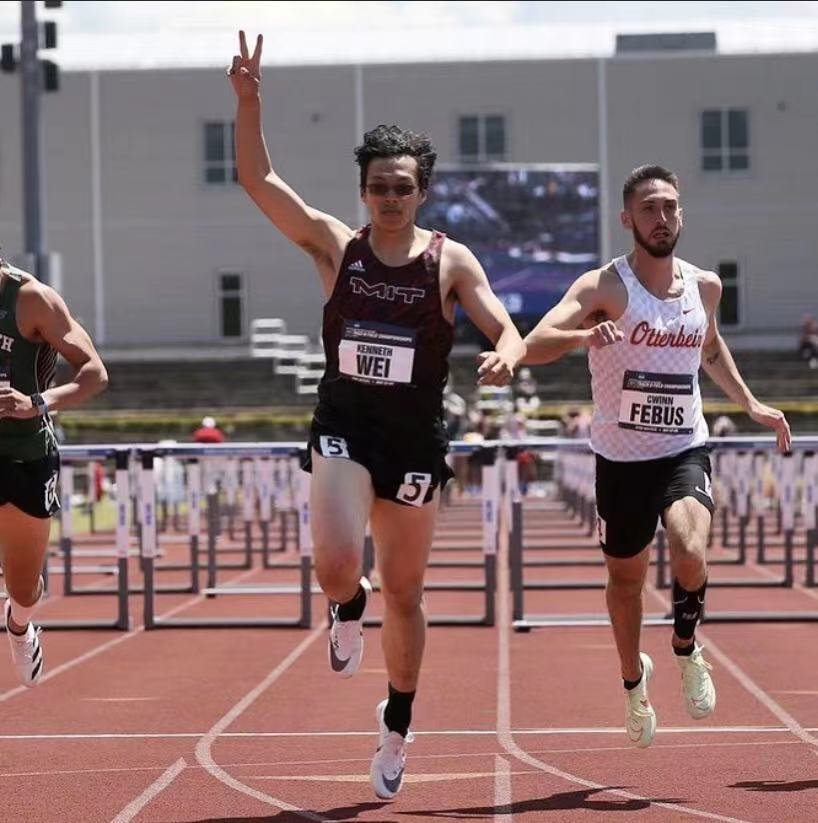Jumping to Conclusions - Kenneth Wei
Kenneth Wei is a senior and student athlete at the Massachusetts Institute of Technology in Boston where he is the NCAA Championship Record Holder in the Long Jump.
When I was in 3rd grade, roughly 8, or 9 years old, I moved to Guangdong, China, with my family. It was a rather intense culture shock - I did not speak much Mandarin in my life up to that point, and I had to adapt quickly to a new, foreign environment.
One thing that really helped me was strangely track and field - my mother ran the 400-meter race and played basketball when she grew up in China and encouraged me to pick up sports as a way to stay active and keep myself motivated whenever I felt out of place (I found myself a bit lacking in the hand-eye coordination department for basketball). My brother, who now runs for the Cornell track and field team, often accompanied me. Running track with him was probably a huge contributor to staying sane while adjusting to a new country. Everything just seemed so simple when I just ran. I learned the fundamentals of track and even got to compete (under hilariously dubious circumstances, but that is a story for another time). For young me, the track was still a pastime, something I did for fun. I never felt pressured to pursue it too seriously at this point in my life.
After moving back to the US, I dropped a track for a bit while adjusting and picked it back up again during high school. I pursued it much more seriously this time around - I took every meeting seriously and always approached my coaches for new techniques and drills to improve upon. However, I never entered any national rankings until my senior year, when my persistence paid off in the hurdles, and I switched over from the high jump to the long and triple jumps. Looking back, this was an interesting analogy between sports and my research. Although I did not start with strong marks in any of my events, I knew which ones to keep going with and which ones to pivot away from in order to prioritize my strengths. This mentality allowed me to be a more effective scientist since I realized juggling multiple experiments while balancing time and resources was much like trying to optimize which events to focus on for track. Identifying critical points in problems and focusing on them was something I (thankfully) learned early on.
Although I became a bit more recruited by college coaches at this point, the academic in me won over the athlete. I chose to attend MIT for my undergrad. Being a student-athlete at MIT is not easy - early on, my marks were not improving as quickly as they did in high school, and I often had less time, sleep, and energy to devote to my sport. But it was still fun - a diversion away from the hectic and chaotic monster that is the Institute. For me, I learned that it is ok not to show tangible improvement. Growth happens in many different ways, often invisible to the eyes of others. For a sport as quantitative as track and field, it can be frustrating not to see improvement even after months of practice. Life has its challenges outside of sports, and learning to be patient and accepting my trajectory is uniquely mine was another lesson that I picked up. There are not many budding scientists that are athletes, and not many athletes that are also interested in pursuing a Ph.D. in the future. What matters is that this path was meaningful to me, and I would have no regrets about balancing both of these facets.
Strangely enough, once I accepted this, I saw my marks begin to improve once more (maybe it was something they started putting in the dining hall food my junior year). This brings me to one of my college coach’s favorite words - execute. To him and his athletes, this meant trusting your preparation. When we practiced, we would nitpick every detail possible - cues to subtly tweak the trail leg for the hurdles, the angle of attack coming out of the blocks, etc. This was the time to be technical and analytical. However, on meet days, this needed to be the furthest thing on our minds. All he asked of us was to trust our preparation and let the adrenaline and the level of competition bring out the best performance in us. It is easy for athletes to overthink their sport and become nervous. However, emptying my mind (which is not easy as a scientist) and letting my training become second nature allowed me to let my body perform at its highest level. It did not matter if I was down to one jump out of six to win a national meet or if I was the last athlete to make it into the finals of a sprint race. I simply told myself to relax and dig into a realm of focus to finish what I needed to do.
Not everyone needs to be a champion or a star athlete. No matter the skill level, I believe that translating what you have learned through athletics (furthermore, any extracurricular/hobby!) into academics or life is the biggest gift you can receive from immersing yourself in something you enjoy. After all, the only experience you can ever truly know is your own, and there is no better way to learn (Mens et manus, if I am allowed to be a bit nerdy) and grow than to do and reflect simply. Just don’t think too hard!


